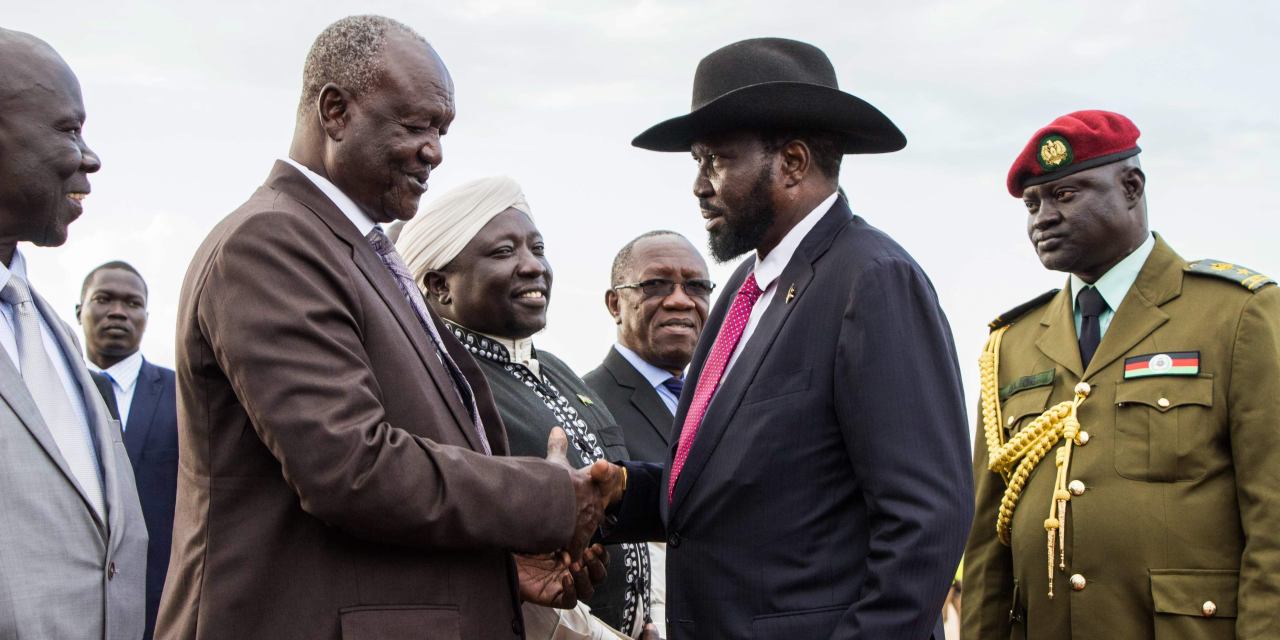South Sudan-US Agreement On The Return Of Deportees

Table of Contents
Key Provisions of the South Sudan-US Deportation Agreement
The South Sudan-US Deportation Agreement outlines a detailed framework for the repatriation of South Sudanese nationals ordered deported from the United States. This framework encompasses several key areas, focusing on the repatriation process, humanitarian considerations, and adherence to international legal standards.
Repatriation Process
The agreement details a step-by-step process designed to ensure safe and orderly returns. This involves close cooperation between both governments.
- US Government Role: The US government is responsible for facilitating the safe passage of deportees, providing necessary travel documents, and ensuring their well-being during transit. This includes coordinating with airlines and other transportation providers.
- South Sudanese Government Role: The South Sudanese government is tasked with receiving deportees upon arrival, providing temporary accommodation at designated reception centers, and assisting with their reintegration into South Sudanese society. This includes providing basic necessities and potentially offering support for job searching or skills training.
- Eligibility Criteria: While the specifics may not be publicly available for security and privacy reasons, the agreement likely outlines criteria for determining who is eligible for deportation, aligning with US immigration laws and international human rights standards.
- Logistical Aspects: The agreement addresses logistical challenges inherent in large-scale repatriation. This includes:
- Secure transportation arrangements.
- Provision of necessary travel documents (passports, visas where applicable).
- Establishment of appropriate reception centers with adequate resources.
- Mechanisms for tracking and monitoring the movement of deportees.
Humanitarian Considerations
A crucial element of the South Sudan-US Deportation Agreement is its commitment to the humane treatment of deportees.
- Human Rights and Well-being: The agreement emphasizes the protection of the human rights and well-being of all individuals undergoing repatriation. This involves safeguarding them from harm during transit and upon arrival in South Sudan.
- Vulnerable Groups: Specific provisions are likely included to protect vulnerable groups such as unaccompanied minors, children, pregnant women, and individuals with disabilities. These provisions may involve specialized care and support.
- Potential Risks in South Sudan: The agreement acknowledges the challenges and potential risks faced by returnees in South Sudan, including ongoing conflict, displacement, and limited access to basic resources. Mitigation strategies are likely included.
- Specific Protections: The agreement will outline specific safeguards for vulnerable individuals, potentially involving:
- Dedicated support services.
- Access to healthcare and shelter.
- Family reunification assistance.
- Legal assistance for those seeking asylum or other forms of protection.
Legal Framework and International Standards
The South Sudan-US Deportation Agreement is grounded in international law and adheres to established standards for the treatment of refugees and deportees.
- International Conventions: The agreement aligns with international human rights instruments, such as the 1951 Refugee Convention and its 1967 Protocol, and other relevant treaties relating to the protection of refugees and the rights of migrants.
- International Best Practices: The agreement incorporates international best practices for managing the return of migrants, promoting humane and dignified repatriation.
- Monitoring Compliance: Mechanisms for monitoring compliance with international human rights standards and the terms of the agreement are likely in place, potentially involving independent observation or reporting mechanisms.
- Relevant Legal Provisions: The agreement explicitly references relevant legal provisions from both US and South Sudanese law, ensuring a legally sound and binding framework for repatriation.
Challenges and Opportunities
While the South Sudan-US Deportation Agreement represents a significant step forward, its implementation faces considerable challenges, alongside opportunities for enhanced cooperation.
Challenges in Implementation
Several obstacles could hinder the effective implementation of the agreement.
- Security Concerns: Ongoing insecurity in parts of South Sudan poses a significant challenge to safe repatriation and the reintegration of returnees.
- Logistical Constraints: The sheer scale of potential deportations and the limited infrastructure in South Sudan could create logistical bottlenecks.
- Bureaucratic Hurdles: Navigating bureaucratic processes in both countries could create delays and inefficiencies.
- Capacity Building Needs: South Sudan requires substantial capacity building to effectively manage the influx of returnees, providing adequate services and support.
- Funding Gaps: Securing sufficient funding for implementing the agreement and providing support services to returnees is crucial.
Opportunities for Enhanced Cooperation
Despite the challenges, the agreement presents opportunities to strengthen US-South Sudan relations.
- Improved Bilateral Relations: The agreement could pave the way for improved diplomatic relations and increased cooperation on other issues.
- Migration Management Collaboration: The agreement provides a foundation for enhanced collaboration on migration management, including addressing the root causes of migration.
- Development Assistance: The process could lead to increased development assistance to South Sudan to support reintegration programs.
- Economic Benefits: The successful reintegration of returnees could potentially contribute positively to South Sudan's economy and social development.
Conclusion
The South Sudan-US agreement on the return of deportees represents a crucial step in managing migration flows between the two countries. While it provides a framework for humane repatriation, its successful implementation will depend on overcoming significant challenges related to security, logistics, capacity, and funding. The agreement emphasizes the importance of protecting the human rights of deportees and fostering cooperation between the two governments. Addressing the humanitarian concerns and ensuring the smooth reintegration of returnees are critical for the long-term success of this South Sudan-US Deportation Agreement. Continued monitoring and international support will be vital in ensuring that the agreement achieves its objectives.
Call to Action: For further information on the South Sudan-US Deportation Agreement and its implications, continue to follow reputable news sources and official government statements. Stay informed about the ongoing developments and the impact on both nations. Understanding the details of this South Sudan-US Deportation Agreement is essential for informed discussion and policy advocacy.

Featured Posts
-
 How Tik Tok Users Are Avoiding Trump Era Tariffs
Apr 22, 2025
How Tik Tok Users Are Avoiding Trump Era Tariffs
Apr 22, 2025 -
 White House Cocaine Investigation Secret Service Concludes Inquiry
Apr 22, 2025
White House Cocaine Investigation Secret Service Concludes Inquiry
Apr 22, 2025 -
 Joint Effort South Sudan And Us To Manage Deportees Return
Apr 22, 2025
Joint Effort South Sudan And Us To Manage Deportees Return
Apr 22, 2025 -
 Increased Student Fear Following Fsu Security Gap Even With Rapid Police Response
Apr 22, 2025
Increased Student Fear Following Fsu Security Gap Even With Rapid Police Response
Apr 22, 2025 -
 Is The Razer Blade 16 2025 Worth It A Detailed Review Of Ultra Performance And Cost
Apr 22, 2025
Is The Razer Blade 16 2025 Worth It A Detailed Review Of Ultra Performance And Cost
Apr 22, 2025
